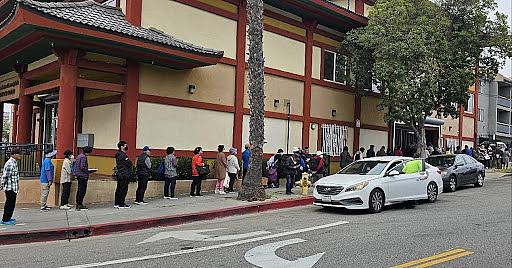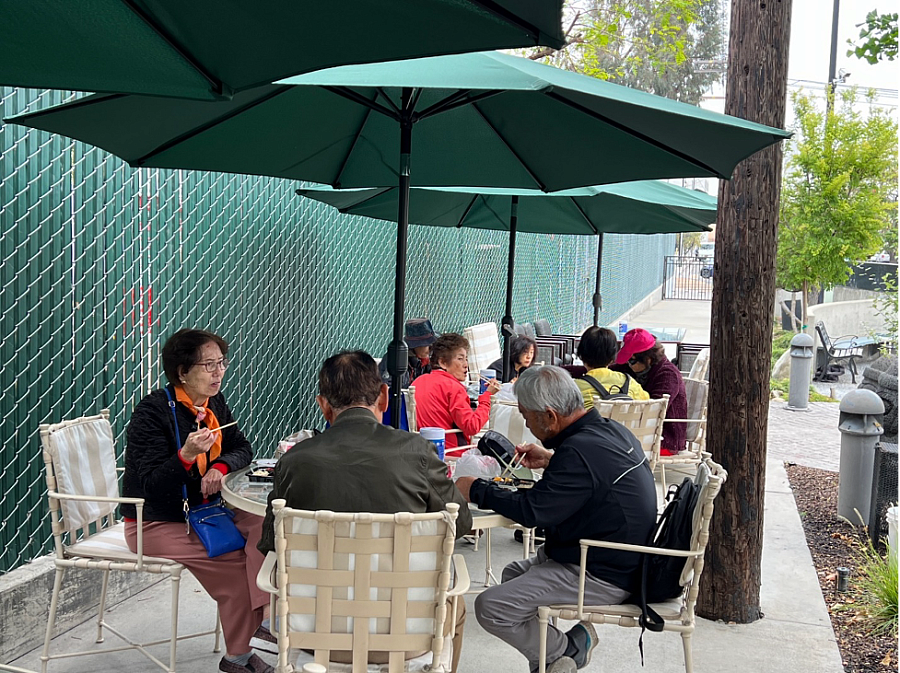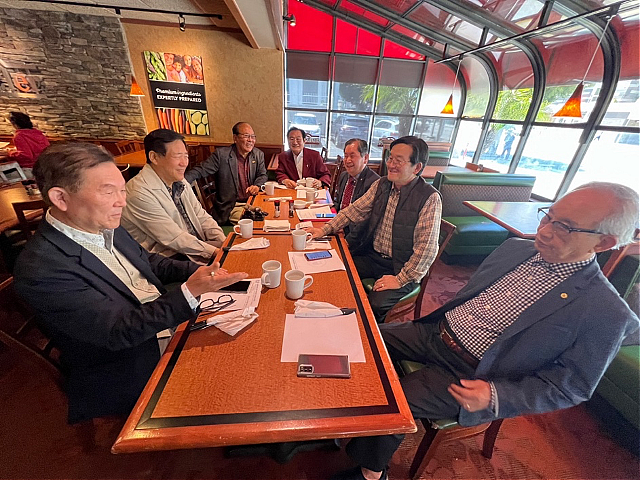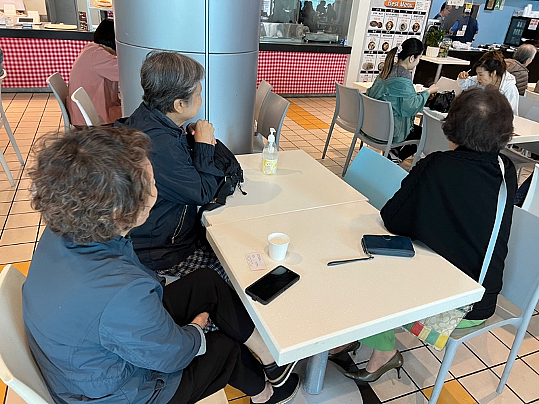Finding a Lunch Meal in Koreatown for Struggling Korean Seniors
The story was co-published with Korea Daily as part of the 2024 Ethnic Media Collaborative, Healing California.

Korean seniors line up at the LA Koreatown Senior and Community Center, which provides free lunch boxes.
Sangjin Kim, The Korea Daily
On May 22nd at 11:30 am, Cecilia Seo (86), who had lunch at a picnic table near Dawooljung(Korean Traditional Garden) Outdoor Table in LA Koreatown Olympic Boulevard and Normandie Avenue. Grandma Seo was more excited than anyone else about the 'Korean lunch box' provided by the LA Koreatown Senior & Community Center through the LA City Department of Aging.
Seniors in Koreatown, one of the most densely populated areas of Los Angeles, are struggling to find a solution for their beloved “lunch meal.”
First-generation immigrants, who are now retired, are suffering from the skyrocketing cost of living. For Korean seniors, finding their lunch meal is one of their biggest concerns. It is not just about having a simple, nutritious meal. Eating lunch in community with others is precious time for socializing with friends and acquaintances.

Korean seniors enjoying a free Korean lunch box
Sangjin Kim, The Korea Daily
Cecilia Seo (86), who was enjoying a Korean lunch box from the LA Koreatown Senior and Community Center through the LA City Department of Aging, said that the free lunch represented “happiness” for seniors. "As I get older, everything becomes bothersome... Cooking rice is not a common task, you know?" and "I used to eat cup of noodles because I didn't want to cook, but now I eat the lunch box every day. I used to get hungry a lot before I got the lunch box. But these days, I don't get hungry anymore. I can take the leftover lunch home and eat it,” she said.
However, for many Korean seniors who rely on Supplemental Security Income (SSI) and Social Security retirement benefits (SSA) as their only source of income, “lunch-well-being” is becoming an increasingly unaffordable tradition.
“Restaurants have become so expensive that it's very difficult for seniors to visit,” said Kwon Sung-joo.” It used to cost only $3 to eat Korean food in senior lunch restaurants, but they disappeared after the pandemic. If there were such restaurants, it would be helpful... Nowadays, if you go to a restaurant, you have to pay $20-25 for lunch, which is not affordable.”
Expensive lunch threatens senior wellness
In the past month, about 10 seniors met at the LA Koreatown Senior & Community Center, fast food chains, and food courts in shopping malls. Many said they receive an average of $800-900 in SSI and $1,200-$1,400 in SSA. Of this, $300-350 is spent on rent for senior apartments, leaving the rest to cover food and everything else.
With lunch prices rising by over $5 per menu (20-30% increase) after the pandemic, dining out has become a luxury. This is why seniors are flocking to Koreatown food courts (menus range from $12-17 including tax) and lunch specials (menus range from $13-15 including tax and tip).
On May 20th at noon, Park Jung-sook (72) and two friends had Korean food at the food court on the 2nd floor of City Center at LA Koreatown. She said, "In the past, it was not a burden to ask a friend to have lunch together, but now it is difficult to bring up the idea of having lunch.”
The cheap Korean restaurant has disappeared

Jim Lee (83) has coffee with friends in LA's Koreatown.
Sangjin Kim, The Korea Daily
On a recent May morning, Jim Lee (83) was having coffee with two friends at Jack in the Box on 6th and Virgil in LA's Koreatown.
"Even the Korean restaurants that used to offer senior discounts are all gone now,” he said. “Even a Big Mac at McDonald's costs over $10 now. The places worth going to have disappeared, and we are left only with places where we don't have to give a tip."
Jennifer Han (67), met at the City Center food court, lamented, "The senior lunch support restaurants where you could eat Korean food for just $3 in Koreatown have disappeared since the pandemic. It would be helpful to have such restaurants...now if you go out to eat, you have to pay $20-25 for lunch, which is too much."
Some suggest that seniors should just eat at home instead of dining out. The seniors themselves are deeply saddened by such comments, emphasizing that meal solutions are not always easy, especially for elderly individuals living alone.
Jennifer Han explained, "I live off of $1100 from SSA and use the rest for my husband's caregiving expenses. There are times when I don't feel like cooking. I want to meet friends. That's why I occasionally go out for lunch."
A representative at the LA Koreatown Senior & Community Center stated, "Those who eat free lunch boxes are mainly in their 70s and 80s. Their health is not as good as we think. It's not easy for them to prepare meals by themselves."
Especially for seniors, dining out for lunch is a precious social time to bond with friends.

Jun Yu (78) visits the City Center food court with two friends
Sangjin Kim, The Korea Daily
Jun Yu (78), who visited the City Center food court with two friends, said, "Seniors from other states, seniors living nearby the beach, they are all gathering in Koreatown (where they can have many friends). It would be great to have more (government-supported or discounted) restaurants where seniors can gather and socialize."
Competition for free lunch for seniors
In LA’s Koreatown, the restaurant that used to provide lunch for seniors for about $3 through a contract with the LA City Department of Aging has disappeared.
The manager of Barbecue Garden near 7th and Vermont Avenue said, "The former owner who used to do business here signed a contract with the city and provided lunch for seniors, but now they can't afford it due to lack of staff and labor costs."
The LA Department of Aging (DA, Director Pacheco Orozco) has been providing free lunch boxes to about 225 seniors aged 60 and over and low-income individuals since January 16 at the request of the LA Koreatown Senior & Community Center (Chairman Shin Young-shin). The lunch boxes were upgraded from Western to Korean on May 1st.
However, there are more than 1000 Korean applicants, and they are lining up from 7 to 8 am on weekdays to break through the free lunch, with a competition ratio of 4 to 1. The center is demanding that the Department of Aging increase the lunch boxes to 500.
Chairman Shin Young-shin said, "If the city provides enough lunch, seniors and low-income individuals can be freed from worrying about what to eat. Providing a meal is a very practical help, so it would be nice if they could allocate more related budgets."
Meanwhile, the LA Department of Aging has stated that they provide the Senior Meals Program to about 6,000 seniors in LA Koreatown.
Of the 37,588 users of the LA County Aging and Disability Department (ADD) Senior Meals Program, 545 are Korean.
This project is supported by the USC Annenberg Center for Health Journalism, and is part of “Healing California,” a yearlong reporting Ethnic Media Collaborative venture with print, online and broadcast outlets across California.

